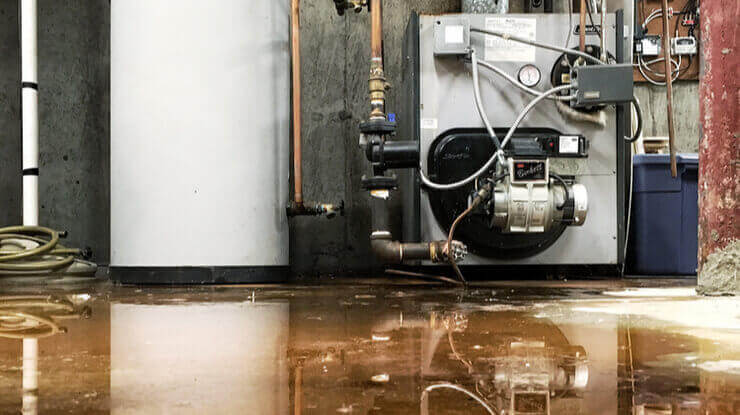Dealing with your home’s damage after a flood can be an exhausting job.
After a hurricane, storm surge, or tropical storm, recovery and rebuilding can seem like an endless task. The job of taking care of your home and salvaging everything possible is important, but it’s even more important to make sure that you and your family are safe.
It’s crucial that you follow safety guidelines when recovering and renewing your natural gas systems after any type of flood.
Safety First
It’s important to make sure it’s safe to enter your home before you try to do any sort of salvage work.
You may be eager to get the job started, but it’s important to wait until a gas contractor declares your home safe before turning your gas back on. Depending on the severity of the flooding and the amount of pressure in the gas lines, your gas pipes could be filled with water. They would need to be drained before your gas is turned back on.
If any of your home’s natural gas appliances have a pilot light that went out during flooding, do not attempt to relight it yourselves. Improperly relighting these items can result in a fire, explosion or carbon monoxide hazard.
Once a gas inspector (typically, a licensed plumber) has confirmed that the coast is clear, you can move on to the important job of assessing the damage.
Start With the Professionals
Even if your gas appliances don’t look like they’re damaged from the flood, you don’t have any way of knowing what’s happening inside.
Have a professional inspect all of your natural gas powered systems, including your HVAC system (assuming you have natural gas heat), water heater, pool heater, natural gas grill, gas dryer, and even your oven. If flooding occurred for your neighbors as well, it may make sense to work together and coordinate inspection with a licensed plumber.
Additionally, if there was damage to the roadway, or if you suspect that your home may have shifted, contact your local utility company to ensure that the gas pipes were not damaged.
Possible Damage to Natural Gas Systems from Flooding
All appliances that run on natural gas have gas valves and controls that are easily damaged by flood water.
Once water gets inside these valves and controls, they will begin to corrode. You may not be able to see this damage happening, and it can happen even if the outside of the appliance is sparkling clean. At the very least, this corrosion damage will make your appliance unreliable.
On the other hand, some severely damaged units have been known to explode or catch fire. This is why it’s important to have a professional check every single appliance that was in contact with any flood water in your home.
How Dirty is Flood Water?
Flood water is very dirty.
Flood water can potentially contain:
- Sewage
- Hazardous waste, including vehicle fluids like oil, gas, anti-freeze; decaying vegetation or animals; pesticides, fertilizers and animal waste.
- Bacteria and viruses including intestinal bacteria such as E. coli, Salmonella, Hepatitis A
- Parasites like Giardia
So that said, make sure if you have been in flood water that you wash with a disinfectant soap. And that brings us to why replacement of your appliances is the most common outcome.
Should I Repair or Replace Appliances after a Flood?
For your safety and your hygiene (but unfortunately for your finances), most professionals recommend replacing flood damaged appliances rather than repairing them.
When deciding whether to repair or replace flood damaged appliances, there are a number of factors that come into play. These include:
- Time: The longer your appliances are wet, the less likely they can be salvaged.
- Warranty: Repairs or replacement parts might void your warranty.
- Corrosion: Floodwater is dirty (see above!), and dirt can corrode certain parts of appliances. Even if the machines are safe to use, you might find problems down the road.
- Age: If your appliances are reaching their golden years anyway, it’s probably best to replace them. Repairs might cost as much or more as buying new, especially if your insurance is covering part of the replacement cost.
Sears Home Services offers these guidelines for which appliances to repair versus replace.
- Repair: Dishwashers, washers and dryers, ranges, microwaves, home electronics, trash compactors and electric water heaters may all be repairable, depending on the extent of the damage.
- Replace: Gas water heaters, small appliances, HVAC units, fridges and freezers will likely need to be replaced.
If you’ve decided to repair a unit after being thoroughly checked by a professional, the least you’ll have to do is to replace pilot and burner orifices, gas valves, the filter, and controls, in addition to thoroughly disinfecting it, inside and out.
How to Care for Electrical Appliances After a Flood
Much like natural gas appliances, your home’s electrical appliances will also be impacted by a flood. If flooding is expected and you have to evacuate your home, local officials may ask you to turn the power off at the breaker (if it is safe for you to do so).
After the flood recedes, check the level of the flood water. If the water rose above the level of your electrical sockets, be sure to have an electrician check out your home before using the electricity. Damage to the wiring, even inside walls where you can’t see it, can pose a fire danger. In general, any electrical equipment that was below water is likely unusable and will need to be replaced.
You can learn more about how to handle electronics before and after a flood by reading 21 Tips to Manage Your Home Utilities in a Hurricane on our sister site, ElectricityPlans.com.
—
If you have been through a flood, you have our condolences. It’s a stressful time. As you get your home cleaned up, be sure to take care of yourself as well.
